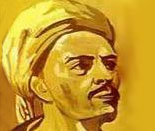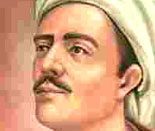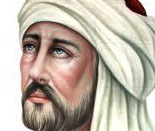 |
 |
| |
|
| |
Yunus Emre: A Great power in Contemporary Turkish Society

|
| |
Yunus Emre was Sufi dervish of Anatolia and little
details were said about his life. However, the love for him and for
his liberating poetry is echoed through the fact that many villages
claim to be his birthplace, and many others declare to hold his
tomb. In addition, different sources put him in different centuries,
and many desire for a respect of association with this great poet.
Some researchers claim that Yunus likely lived from AD1240-1241 to
1320-21. He was understood to be one of the members of a family from
the Karaman region who migrated from Horasan to the village of Seyh
Haci Ismail. The head of Yunus' family Seyh Haci Ismail thought to
be the founder of this village when they moved to Anatolia with his
followers called "cemaat”.
Yunus poetry demonstrates a deep personal mysticism, humanism and
love for God. He is one of the wandering hippies of 60's with torn
clothing, and a person who loved to love like a true mystic. He
wandered around Anatolia with turn clothing, called a dervish robe.
He was a Sufi dervish of Islam, and shared an exceptional part in
Turkish literature, philosophy and culture.
Many writers considered him as the most important poet in Turkish
history and gave a great impact in Turkish culture. In various ways
this can be seen. There were days that purifying Turkish language was
a struggle. Yunus poetry becomes the prime example of the dialect of
Anatolian peasants. Many authors declare that many idioms in
everyday language are actually verses from his poetry.
|
 |
|
| |
 |
|
| |
|
| |
Furthermore, Yunus life is a manifestation of a restructured
personality of Rumi, who lived in the same region. Rumi wrote his
compilation of stories and songs for an intellectual urban group of
Sufis, who writes primarily in the literary language of Persian. On
the other hand, Yunus Emre traveled and taught among the rural poor,
singing his songs in the Turkish language of the common people.
His philosophy, metaphysics and humanism have been evaluated in
various many symposiums and conferences on a daily basis not only in
Turkey and but abroad. His poetry has been given different
translations, and historians consider his method of ideas as
important evidences about thirteenth-century Anatolia. Yunus life
turned out to be the focus of vast study and argument among both
Turkish and foreign scholars. As a result, Yunus' reputation becomes
more accepted among the Anatolian people and marked him as one of
the most important cultural figure in Turkey’s history.
|
 |
|
| |
|
| |
|
| |
|
|
| |
The rest of his life - whether he is wandering or dervish or a Seyh
of a tekke, including his Sufi order, his poetry, and his death are
all mysteries, with various sources giving different
interpretations. Well, the historical details of Yunus life would
not be that important but how common people of Anatolia viewed his
life. This is disclosed very well in legends and poetry; some people
even propose that "Yunus" is actually a school of thought in 13th
century Anatolia, not a single person. This only shows how Yunus
influence the lives of contemporary Turkish society.
Few poems of Yunus Emre... |
|
| |
THE DRINK SENT DOWN FROM TRUTH
The drink sent down from Truth,
we drank it, glory be to God.
And we sailed over the Ocean of Power,
glory be to God.
Beyond those hills and oak woods,
beyond those vineyards and gardens,
we passed in health and joy, glory be to God.
We were dry, but we moistened.
We grew wings and became birds,
we married one another and flew,
glory be to God.
To whatever lands we came,
in whatever hearts, in all humanity,
we planted the meanings Taptuk taught us,
glory be to God.
Come here, let's make peace,
let's not be strangers to one another.
We have saddled the horse
and trained it, glory be to God.
We became a trickle that grew into a river.
We took flight and drove into the sea,
and then we overflowed, glory be to God.
We became servants at Taptuk's door.
Poor Yunus, raw and tasteless,
finally got cooked, glory be to God.
(English version by Kabir Helminski
& Refik Algan)
|
ASK THOSE WHO KNOW
Ask those who know,
what's this soul within the flesh?
Reality's own power.
What blood fills these veins?
Thought is an errand boy,
fear a mine of worries.
These sighs are love's clothing.
Who is the Khan on the throne?
Give thanks for His unity.
He created when nothing existed.
And since we are actually nothing,
what are all of Solomon's riches?
Ask Yunus and Taptuk
what the world means to them.
The world won't last.
What are You? What am I?
(English version by Kabir Helminski
& Refik Algan) |
|
| |
TRUE SPEECH IS THE FRUIT OF NOT SPEAKING
True speech is the fruit of not speaking.
Too much talking clouds the heart.
If you want to clear the heart,
say this much, the essence of all talking:
Speak truly. God speaks through words truly spoken.
Falsity ends in pain.
Unless you witness all of creation in a single glance,
you're in sin even with all your religion.
The explanation of the Law is this:
The Law is a ship. Truth is her ocean.
No matter how strong the wood,
the sea can smash the ship.
The secret is this:
A "saint" of religion may in reality be an unbeliever.
We will master this science and read this book of love.
God instructs. Love is His school.
Since the glance of the saints fell on poor Yunus
nothing has been a misfortune.
(English version by Kabir Helminski
& Refik Algan) |
THE LOVER IS OUTCAST AND IDLE
My soul,
the way of the masters
is thinner than the thinnest.
What blocked Solomon's way was an ant.
Night and day the lover's
tears never end,
tears of blood,
remembering the Beloved.
"The lover is outcast and idle,"
they used to tell me.
It's true.
It happened to me.
I tried to make sense of the Four Books,
until love arrived,
and it all became a single syllable.
You who claim to be dervishes
and to never do what God forbids --
the only time you're free of sin
is when you're in His hands.
Two people wer talking.
One said, "I wish I could see this Yunus."
"I've seen him," the other says,
"He's just another old lover."
(English version by Kabir Helminski
& Refik Algan) |
|
| |
|
|
<-Back |
|
|
 |
|
